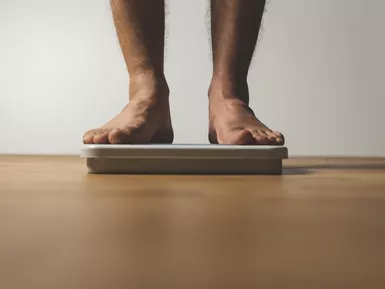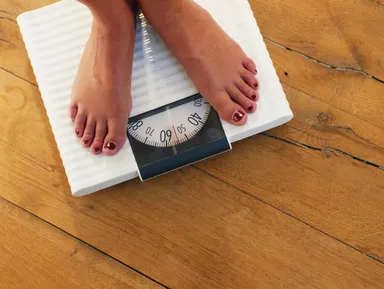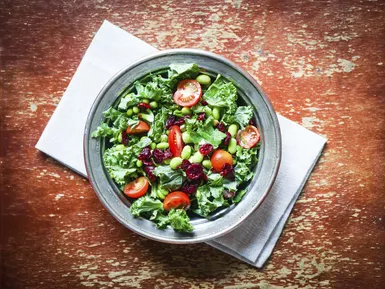Can You Lose Weight With Fibroids? Safe, Effective, and Empowering Strategies Explained

Can You Lose Weight With Fibroids? Safe, Effective, and Empowering Strategies Explained
If you're navigating life with fibroids—those common, noncancerous uterine growths that affect a staggering 70-80% of women by age 50—and also finding it challenging to manage your weight, please know you are far from alone. Many women I speak with report feeling "stuck," frustrated by symptoms like persistent bloating, overwhelming fatigue, or hormonal shifts that seem to sabotage their best efforts.
But here’s some genuinely good news, backed by science and experience: weight loss is absolutely possible, even with fibroids. It simply requires a more tailored, compassionate, and understanding approach. Let's explore how.
Understanding How Fibroids Can Influence Weight (and Your Metabolism)
It's helpful to understand why fibroids might make weight management feel more complex. According to the National Institutes of Health (NIH) and other leading medical sources, fibroids can influence your weight and metabolism through a few key mechanisms:
- Hormonal Imbalances: Fibroids often thrive in an estrogen-dominant environment. Estrogen, while essential, can also play a role in metabolic regulation and may promote the storage of abdominal fat when levels are imbalanced.
- Symptom-Related Barriers to Activity & Wellbeing:
- Heavy Menstrual Bleeding: This common fibroid symptom can lead to iron-deficiency anemia, causing profound fatigue and making it incredibly difficult to find the energy for physical activity.
- Bloating and Abdominal Discomfort: Enlarged fibroids can cause significant bloating, pressure, and discomfort, which can sometimes mask true fat loss on the scale or make certain movements uncomfortable.
- Potential Medication Effects: Some medical treatments for fibroids (like GnRH agonists) can, for some women, temporarily cause side effects such as water retention or a slowed metabolism. It's important to discuss these possibilities with your doctor.
Recognizing these factors isn't about feeling defeated; it's about empowering you with knowledge to make informed choices.
Yes, You Can Lose Weight—Here’s Your Compassionate, Actionable Guide
The fundamental principle of energy balance (the relationship between calories consumed and calories expended) still applies when you have fibroids. However, the presence of fibroids calls for thoughtful adjustments and a focus on holistic well-being. Let’s break down safe and effective strategies:
1. Prioritize a Fibroid-Friendly, Anti-Inflammatory Diet
Nourishing your body with the right foods can make a significant difference in both weight management and how you feel with fibroids. Harvard Health and other leading institutions recommend focusing on anti-inflammatory foods that can also help modulate estrogen levels:
-
Boost Your Fiber Intake: Aim for 25-30 grams of fiber daily. Foods like oats, legumes (beans, lentils, chickpeas), berries, flaxseeds, and a wide variety of vegetables help bind to excess estrogen in the digestive system, promoting its excretion. Fiber also keeps you feeling fuller for longer, aiding in weight management.
-
Choose Lean, High-Quality Proteins: Opt for fish (especially fatty fish rich in omega-3s like salmon), organic poultry, tofu, or tempeh more often than red meat. Some research suggests high heme iron intake (found predominantly in red meat) might be linked to fibroid growth, though more studies are needed.
-
Mindfully Limit Processed Sugars & Refined Carbohydrates: Sugary foods and drinks, as well as highly refined carbohydrates (white bread, pastries), can cause rapid spikes in insulin. Elevated insulin can, in turn, potentially boost estrogen production. Satisfy your sweet cravings with whole fruits (which also provide fiber and antioxidants) or a small amount of dark chocolate (70%+ cocoa).
-
Incorporate Iron-Rich Foods (Especially if You Experience Heavy Bleeding): To combat potential anemia and resulting fatigue, include iron-rich foods like spinach, lentils, chickpeas, pumpkin seeds, and fortified cereals. Crucial Tip: Pair these iron sources with foods rich in vitamin C (like citrus fruits, bell peppers, or tomatoes) to significantly enhance iron absorption.
-
Your Personal Food-Symptom Journal: Consider keeping a simple journal for a week or two, noting what you eat and any symptoms you experience (like bloating, pain, or energy dips). Some women find that specific foods (dairy or caffeine are common examples for some, but not all) may temporarily worsen their fibroid-related bloating or discomfort. This personal insight can be invaluable.
2. Exercise Smart—Focus on Enjoyment and What Feels Good, Not Just "Hard"
The American Council on Exercise (ACE) wisely advises that if fibroids cause abdominal discomfort or pressure, it's best to avoid high-impact exercises or movements that excessively strain the abdomen (like traditional crunches or intense core work that causes bearing down). Instead, embrace movement that supports your body:
-
Gentle, Low-Impact Cardio: Activities like swimming, cycling (stationary or outdoor), brisk walking, or using an elliptical trainer can be fantastic for boosting calorie burn and improving cardiovascular health without adding undue pressure to your pelvic region.
-
Strategic Strength Training: Building and preserving lean muscle mass is key for a healthy metabolism (muscle burns more calories at rest than fat does!). Focus on exercises that strengthen your upper body, back, and glutes (e.g., dumbbell rows, bicep curls, squats, lunges – modify as needed). Listen to your body and avoid movements that cause pain.
-
Restorative Yoga or Pilates: Gentle stretching, mindful movement, and core stabilizing exercises found in yoga and Pilates can improve circulation, reduce stress (a critical factor in cortisol-driven weight retention), and enhance body awareness.
-
Unique Insight for Specific Fibroid Types: Women with submucosal fibroids (those growing into the uterine cavity) often experience more pronounced bloating and pelvic pressure. During flare-ups or periods of increased discomfort, prioritize non-abdominal workouts and gentle movement. Always listen to your body’s signals.
3. Nurture Your Hormonal Balance and Manage Stress Effectively
Chronic stress is a known saboteur of both weight loss efforts and hormonal harmony. It leads to elevated cortisol levels, which can drive abdominal fat storage and may even influence fibroid growth. The Mayo Clinic and other health authorities suggest these stress-management and hormone-balancing strategies:
- Prioritize Quality Sleep (7-9 hours): Consistent, restful sleep is non-negotiable. Poor sleep disrupts crucial hormones like leptin (which signals satiety) and ghrelin (which signals hunger), often leading to increased cravings and overeating.
- Embrace Mindfulness Practices: Even 10-15 minutes of daily meditation, deep breathing exercises, or mindful walking can significantly lower cortisol levels and promote a sense of calm.
- Limit Alcohol Consumption: Alcohol metabolism can increase estrogen levels in the body. If you choose to drink, consider limiting intake to 1 drink per week or less, especially if you're actively working on managing fibroids and weight.
Common Myths About Fibroids and Weight Loss: Let's Get Clear
Misinformation can be incredibly disempowering. Let's bust a few common myths:
- Myth 1: "Fibroids make weight loss impossible."
- Fact: While fibroid symptoms can certainly complicate the journey and require a more nuanced approach, the fundamental principles of energy balance still apply. It is possible, and many women successfully manage their weight with fibroids.
- Myth 2: "Crash diets or extreme cleanses will shrink my fibroids."
- Fact: Extreme calorie restriction and restrictive "detox" diets can severely stress your body, potentially worsening hormonal imbalances and offering no proven benefit for fibroid reduction. Sustainable, balanced nutrition is key.
- Myth 3: "All exercise is bad if you have fibroids."
- Fact: This is far from true! While you might need to modify or avoid certain high-impact or abdominal-focused movements that cause discomfort, most forms of physical activity are beneficial and support overall health, including managing fibroid symptoms.
When to Seek Professional Guidance and Support
It's so important to have a supportive healthcare team. Please consult your gynecologist and consider working with a registered dietitian if:
- Your weight loss efforts stall despite consistent, healthy habits.
- You experience severe fatigue, very heavy menstrual bleeding, or significant pain.
- Your fibroids are diagnosed as being particularly large (e.g., consistently larger than 5cm or causing significant symptoms), as they may require medical intervention options like Uterine Artery Embolization (UAE), Myomectomy, or other surgical procedures to be discussed with your doctor.
A registered dietitian specializing in women's health or hormonal balance can provide personalized dietary strategies that work with your body and your fibroids.
Final Takeaway: You Are Capable, and It Is Possible
Losing weight and managing your well-being with fibroids requires patience, self-compassion, and a personalized approach, but it is absolutely far from impossible. By focusing on nourishing, anti-inflammatory foods, embracing gentle and smart movement that feels good for your body, and diligently managing stress, you can not only work towards your weight goals but also potentially improve your fibroid symptoms and overall quality of life.
Start small, be kind to yourself, and celebrate every positive step. Perhaps tomorrow you could try a 20-minute gentle walk, or today you could swap one sugary snack for a handful of delicious berries. Your body (and your future self) will thank you for these acts of self-care. You've got this.
Disclaimer: This content is for educational and informational purposes only and does not constitute medical advice. Always consult with your healthcare provider or gynecologist before starting any new weight loss plan, exercise program, or making significant changes to your diet, especially when managing a condition like uterine fibroids.

The Atkins Diet: What to Eat and Avoid for Weight Loss Success

Debunking 5 Sugar Myths for Successful Weight Loss

The Impact of Weight Loss Pills During Pregnancy & Scientific Weight Management Strategies Introduction

How Fast Can a 250-Pound Person Healthily Lose 10 Pounds? A Compassionate and Realistic Guide

How Long to Lose 50 Pounds on a 1,200-Calorie Diet? Science-Based Timelines

Navigating a Diverticulitis Diet: 7 Key Foods to Limit During Flare-Ups (and What to Eat for Gut Comfort)

1,200-Calorie Diet for Men: Safe Strategies for Effective Weight Loss

400 Calories Burned: 7 Enjoyable Activities for Safe, Effective, and Sustainable Weight Loss

Low-Carb Tomato Soup: Keep the Comfort, Cut the Carbs

